A statement from Antje Bärtschi, who is the spokeswoman for the State Secretariat for Economic Affairs (SECO), said: “In a conversation with the Saudi Chargé d'affaires ad interim in Bern, the Federal Department of Foreign Affairs has expressed its concern and called for clarification on the journalist's fate. Switzerland is very worried about the events surrounding the Jamal Khashoggi’s disappearance.”
This is the first official position that the Swiss have taken since the journalist went missing.
When asked if Switzerland would impose economic sanctions on Saudi Arabia, Bärtschi said the government would decide on a “case by case basis.”
Bärtschi added that sanctions would only be “”legally binding under international law” if implemented by the United Nations. If this were to happen, however, Switzerland would be expected to do likewise.
A well-known Saudi journalist and former adviser to the Saudi royal family, Jamal Khashoggi, went into his country's consulate in Istanbul on 2nd October in order to obtain a marriage document.
According to reports, Turkish police will today search the Saudi Arabian consulate in Istanbul. They believe Khashoggi never left and was murdered inside the consulate.
Some sources in Turkey allege that he was killed by a team of 15 Saudi agents.
The Saudi government strongly denies this and maintains Khashoggi left shortly after arriving, describing suggestions he was murdered as “lies and baseless allegations”
In the face of growing diplomatic pressure to give a fuller explanation of the situation, Saudi Arabia's King Salman ordered an investigation on Monday 15th October.
A Saudi official was quoted by Reuters news agency as saying: “The king has ordered the public prosecutor to open an internal investigation into the Khashoggi matter based on the information from the joint team in Istanbul.”
US President Donald Trump has promised to severely punish Saudi Arabia if it is found to have killed Khashoggi. However, he has ruled out blocking military sales even if the allegations prove to be true.
Saudi Arabia is a key partner for Switzerland and, according to SECO, the trade volume between the two amounted to CHF2.5 billion last year.



 Please whitelist us to continue reading.
Please whitelist us to continue reading.